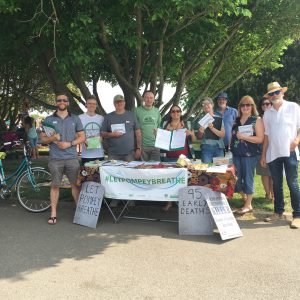Let Pompey Breathe is back again to talk about air pollution. You can read all about our campaign to reduce air pollution in Portsmouth and find more information on the petition we are currently collecting signatures for here. Today (21st of June) is Clear Air Day and we want to talk about ways you can protect yourself from air pollutants and how to join in the fight for clean air.
Communication is key
Poor air quality is a huge issue, and it can seem overwhelming to think about how we can tackle it, as individuals. Dealing with this growing problem requires a joint effort, we need councils, local business and residents to work together. Education and engagement is critical, there still seems to be a disconnect between people’s understanding of the consequences of dirty air and its impact on our health. With an estimated 40,000 premature deaths a year across the country due to outdoor air pollution, according to a report from the Royal College of Physicians, it’s become a national health crisis. So we need to build awareness of the problem. Some suggestions are:
- Talk to your friends, family and colleagues about air pollution and what they can do to help reduce it and to protect themselves from it, particularly the vulnerable including young children, the elderly and those with respiratory problems.
- Approach your employer about how they plan to address poor air quality. Could they set up a cycle to work scheme, update their transport policy or change suppliers?
- If you’re a parent, speak to other parents and school teachers about starting a ‘walk to school’ campaign (a ‘walking bus’), or setting up a car share scheme.
- Use social media platforms to spread the word and pass on useful information. Make sure to use hashtag #LetPompeyBreathe
- Contact your local councillors to tell them you care about this problem and urge them to press for improvements in your neighbourhood and places in the city you visit regularly. One simple but effective step would be to erect signage alerting drivers not to idle their engines illegally, particularly in busy public places or where there are young children such as outside schools, at taxi ranks, bus and train stations.
Dirty Air isn’t just outside
In addition to the estimated 40,000 deaths a year due to outdoor air pollution there’s also the yet unquantified effects of indoor pollutants, which include radon, biological materials, particulates and nitrogen dioxide. This needs serious consideration as we spend the majority of our time inside. But there are some measures that can be taken to lower the risk:
- Ensure you open windows when cooking.
- Dry your washing outside whenever possible. It’s important to have good ventilation to reduce your exposure and these steps will also help reduce the accumulation of moulds which are air pollutants.
- If you have a wood-burning fireplace, consider replacing it with a natural gas version. Not only will you reduce the emissions going outside, but the air quality should improve in your home.
- Candles are another cause of air pollution so limit your use of these where possible.
- By using less gas and electricity, you’ll reduce the air pollution you are creating. Simple steps like switching off lights when not in use, only running the washing machine/dishwasher when there’s a full load and filling the kettle with only the water you need, can reduce your energy consumption and save you some money in the process!
- A report by Nasa revealed that there are some plants which are known for cleaning the air and are mostly easy to look after. These include Rubber Plant, Peace Lily, Ficus Alii, Spider Plant, Dracaena, Weeping Fig, several species of Palm, and different varieties of Philodendron.
Reducing air pollution would not only protect our health but also slow down climate change. There is still hope if we work together and act quickly.

One Response